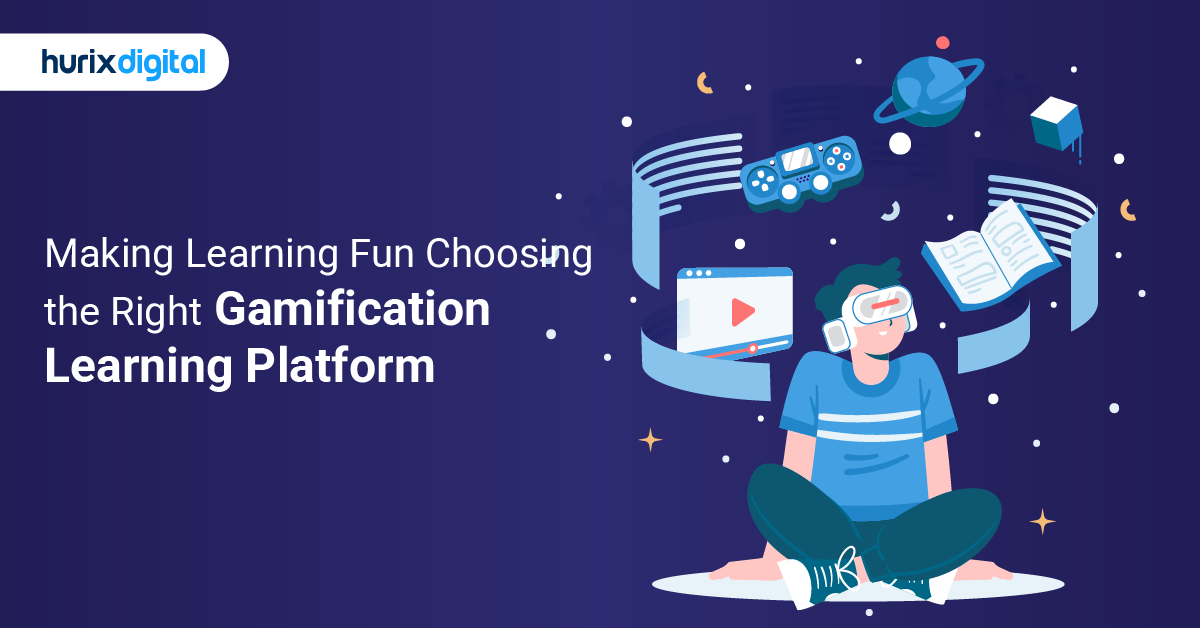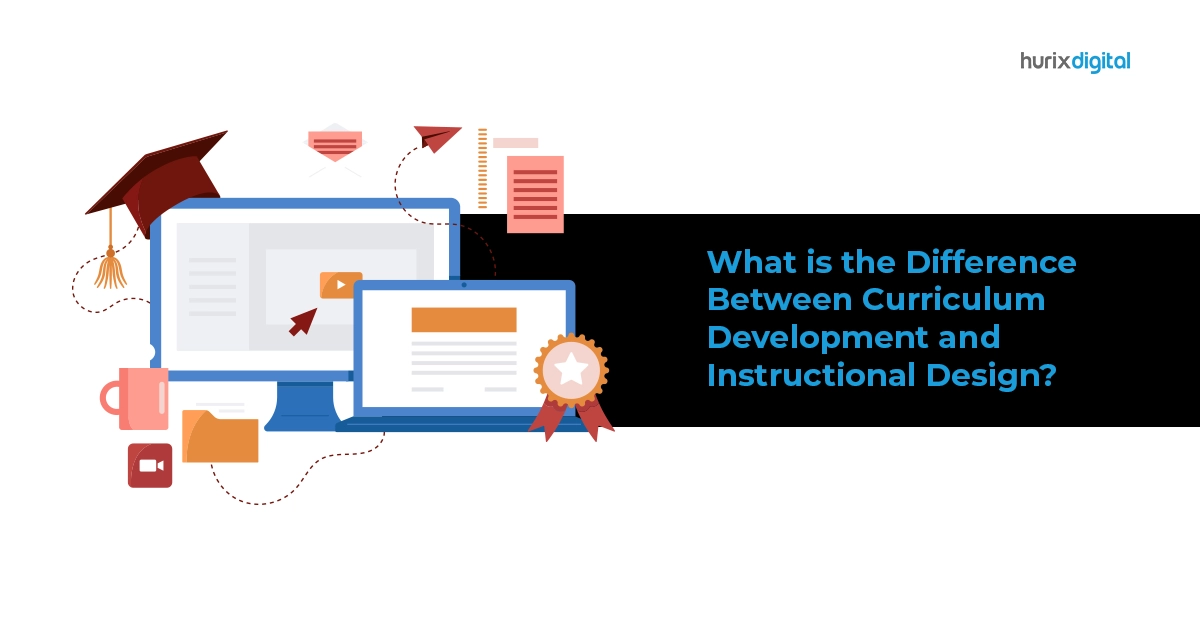
Curriculum Specialists Shape Education and Drive Program Success
Summarize with:
Curriculum development is a cornerstone for shaping students’ learning experiences and mentoring their academic journey. Developing an effective and relevant curriculum demands not only the expertise of curriculum specialists but also the active engagement of all stakeholders involved.
Stakeholders who are teachers, parents, administrators, and community members have a vested influence in the educational process and bring a unique perspective and insights that are integral to the development of the curriculum.
It was established that stakeholder involvement in curriculum implementation explained 71.1% of the variance in successful curriculum development.
In this context, curriculum specialists play a crucial role. They design and develop curriculum frameworks and adapt them to align with evolving educational standards and technological advancements.
In this article, we’ll explore their roles and responsibilities and understand how they contribute to shaping the quality of K12 education. Let’s dive in!
Table of Contents:
- Understanding the Landscape of Curriculum Development
- A Brief Introduction to Curriculum Specialists
- Responsibilities of Curriculum Specialists
- Four Key Ways Curriculum Specialists Enhance K12 Education
- Why Data-Driven Decision-Making Is Essential in Curriculum Measurement
- Core Methods for Measuring Curriculum Effectiveness
- Best Practices for Implementing Effective Curriculum Evaluation
- Emerging Trends in Curriculum Evaluation
- Wrapping Up
Understanding the Landscape of Curriculum Development
Curriculum development is a multifaceted process crucial for educators and stakeholders, guiding the creation of efficient educational programs. It is initiated by defining the purpose and educational philosophy followed by setting clear objectives which are aligned with the goals.
Curriculum development takes a systematic approach and cultivates enriching experiences, equipping students with the skills and knowledge needed for success.
A Brief Introduction to Curriculum Specialists
In the realm of K12 education, where curriculum design is complex, curriculum specialists emerge as key players in shaping and upholding effective educational outcomes.
Their role involves close collaboration with educators, administrators, and leadership to continuously refine the learning framework by institutional guidelines, organizational objectives, and learners’ diverse needs.
The essential prerequisites for becoming a curriculum specialist often start with a mandatory bachelor’s degree in education. Additionally, with extensive experience in teaching students and administration, professionals will gain the relevant skillset required for curriculum design.
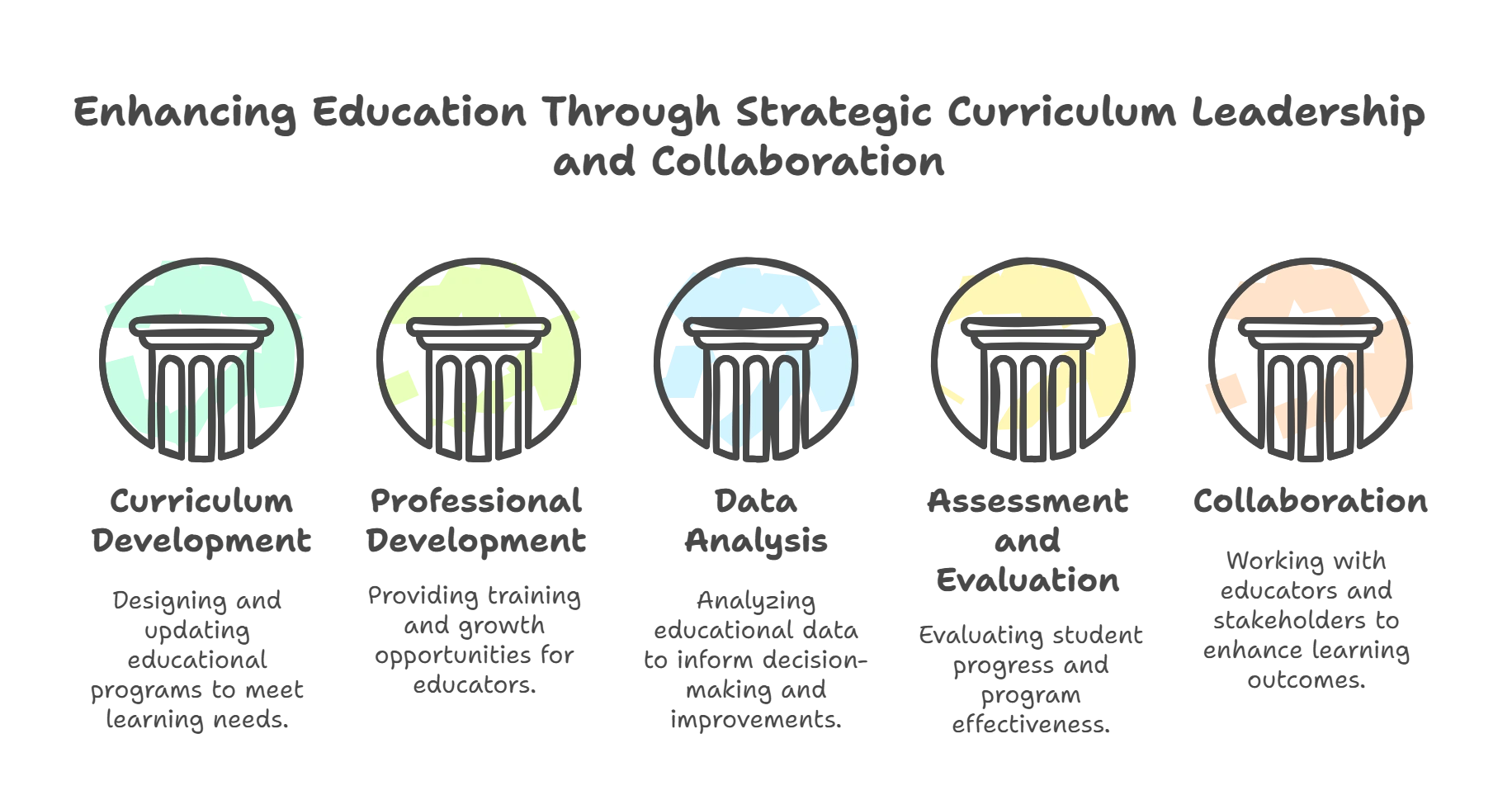
Responsibilities of Curriculum Specialists
Here are five key responsibilities that a curriculum specialist carries out as a part of the K12 education framework:
1. Curriculum Development
The fundamental responsibility of a curriculum specialist is designing and regularly updating educational programs. As the needs of learners are constantly evolving variables, a curriculum specialist spearheads the task of setting the structure to align a learner’s needs with relevant academic standards.
They are also responsible for keeping the curriculum’s constant development incremental and stable to minimize resistance to change and eliminate any fluctuations in learning curves for educators and learners.
2. Professional Development
While curriculum design is crucial, it must also be executable. A curriculum specialist must ensure that educators’ skill sets are updated in tandem with curriculum growth. This often entails providing educators with relevant training and supporting them to enhance their practice.
Curriculum specialists are responsible for one key aspect of professional development: helping educators effectively integrate new teaching methodologies and the latest technologies into their practice.
3. Data Analysis
While analyzing educational data is part and parcel of the curriculum design process, specialists are responsible for identifying learning trends and assessing student performances. This data is used directly to improve curriculum design but also has a purpose in the bigger picture.
The data analysis executed by a curriculum specialist also provides an essential insight into possible changes in the ever-developing learner’s needs. It can, in turn, be used to steer an educational institution’s business model and framework.
4. Assessment and Evaluation
With all this design and professional development, an institution’s feedback system must be robust.
Curriculum specialists also develop assessment tools to measure learning outcomes. This ultimately helps specialists evaluate the impact of their strategies and can be used as a reflection of their progress toward organizational goals.
This is one of the most crucial responsibilities of a curriculum specialist, considering that it allows for self-improvement and measures the overall pace of development in K12 education.
5. Collaboration
Collaboration is a big part of a curriculum specialist’s role. They use their people skills to ensure everyone works together smoothly, from planning to implementing lessons.
By working together, curriculum specialists help create a curriculum that meets the needs of students while also aligning with the school’s objectives and standards. It’s like building a puzzle where every piece fits together perfectly to create the big picture of effective education.
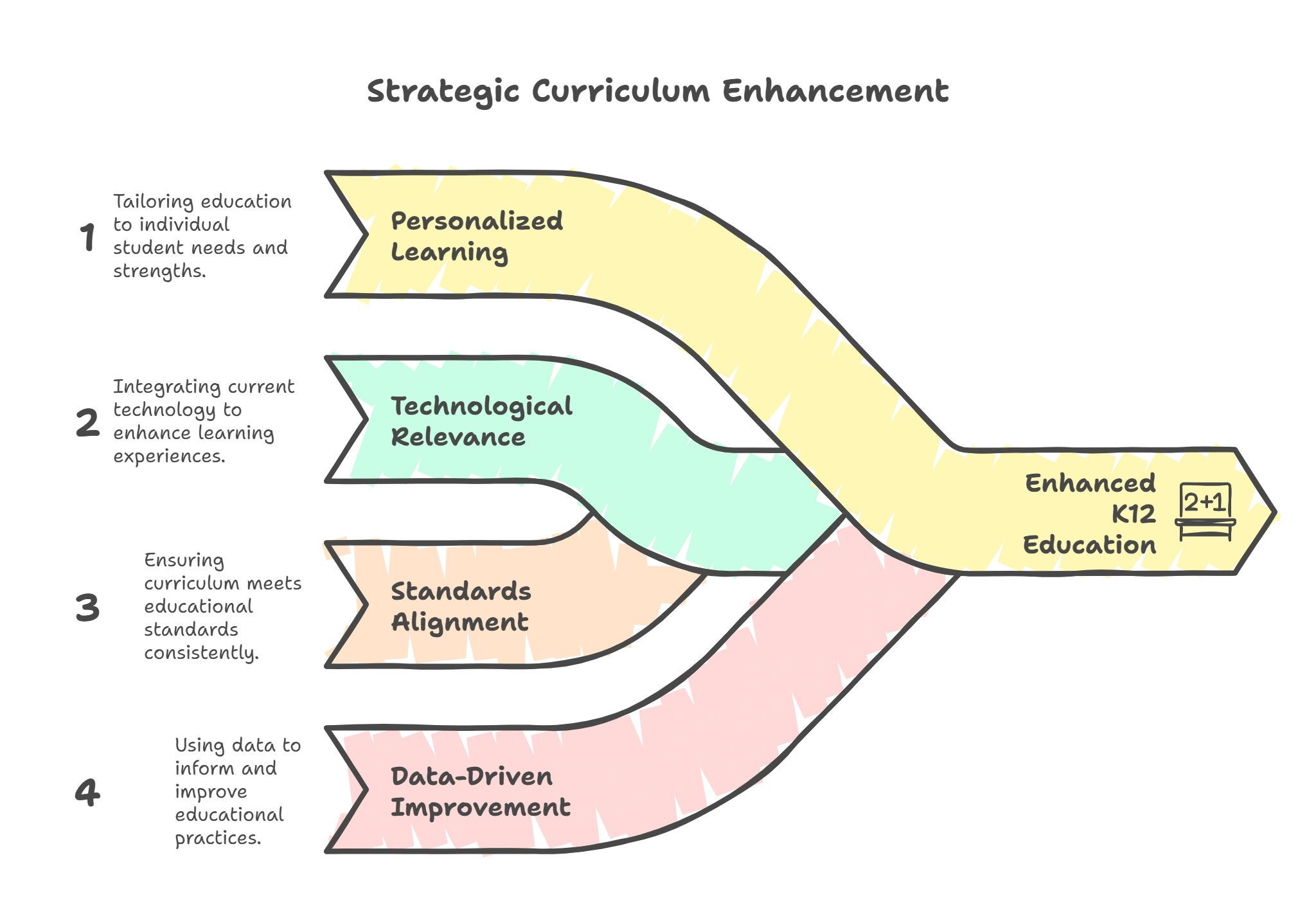
Four Key Ways Curriculum Specialists Enhance K12 Education
Here are the four main advantages that curriculum specialists bring to K12 education:
1. Personalized Learning Enhancement
With approximately 49.4 million students enrolled in primary and secondary education, it’s clear that each student possesses unique needs and learning styles.
Curriculum specialists recognize this diversity and tailor learning experiences to suit individual students, ensuring that each learner receives personalized attention and support.
2. Technological Relevance
Curriculum specialists stay current with technological updates through extensive data analysis. As data analysis is part of their core responsibilities, they review learners’ current needs and identify the technologies and resources that need to be implemented.
By integrating data analysis with curriculum development and collaborating closely with IT design teams, these professionals ensure that each personalized learning module remains current and dynamic. This proactive approach eliminates the risk of obsolescence, guaranteeing that students have access to cutting-edge resources tailored to their educational journey.
3. Consistent Alignment with Standards
As drivers of the curriculum frameworks, curriculum specialists align learning modules with state and national educational standards and the organization’s unique vision.
With this being the specialist’s benchmark and foundation behind curriculum design, all forms of learning content are crafted and delivered with high consistency and quality across schools and branches.
Standardized delivery also improves data reliability that a curriculum specialist derives from performance trends, eventually boosting the accuracy of all estimations regarding learners’ growing needs.
4. Organic, Data-Driven Improvement
With high engagement and a focus on how educators and learners react to the current curriculum, curriculum specialists can develop better designs while considering cultural feedback, scientific performance indicators, and responses to incremental changes that work in tandem with technological integration.
Curriculum specialists drive continuous improvement by focusing on professional development, best practices, and potential innovations. This iterative process of refining educational content is not only organic and empathetic but also rooted in data, ensuring that each adaptation is informed by real-world feedback and geared towards enhancing student outcomes.
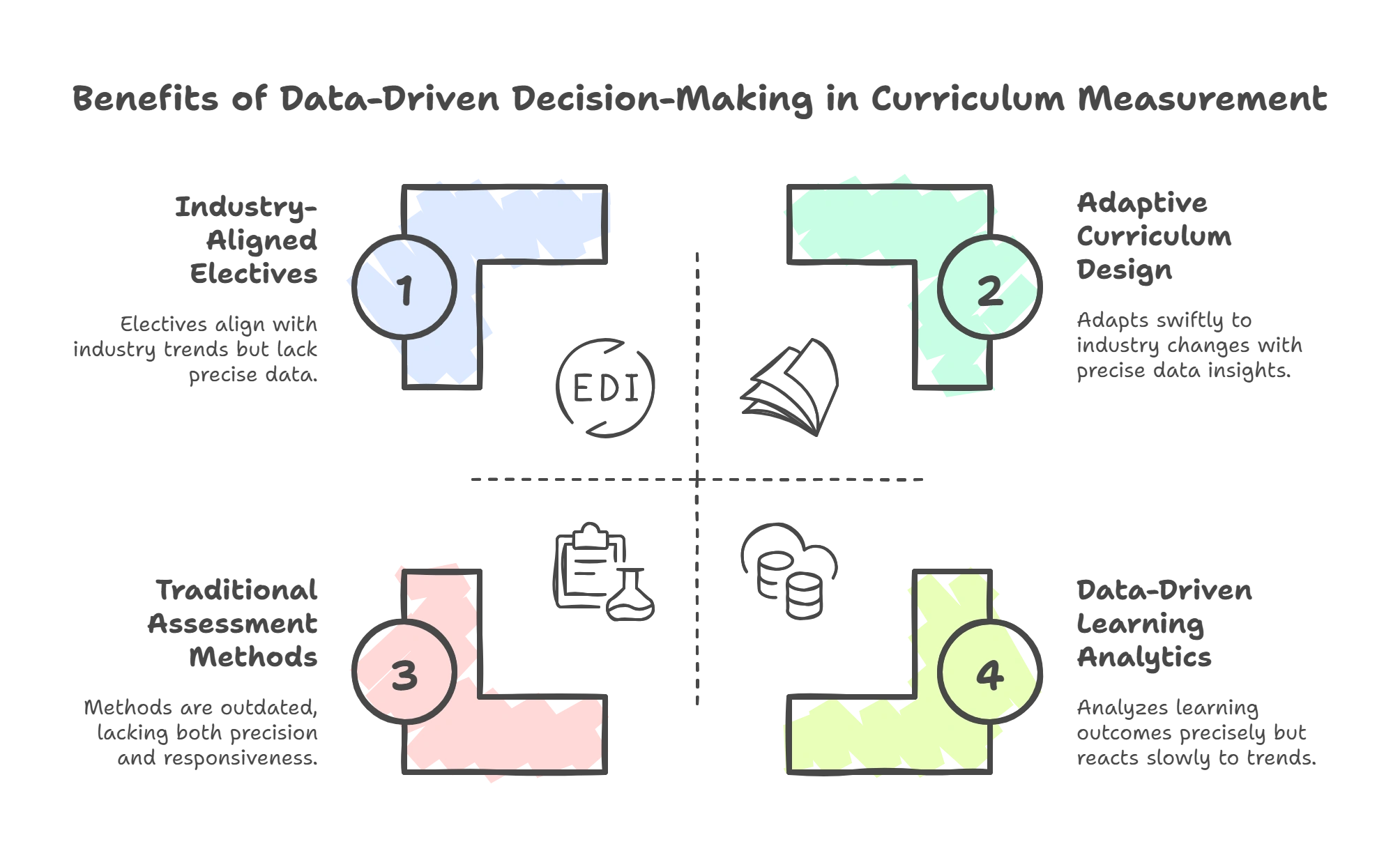
Why Data-Driven Decision-Making Is Essential in Curriculum Measurement
Data is key to curricular efficacy. Universities may adjust and react to shifting academic and industry landscapes through data-driven decision-making.
By analyzing performance data, curriculum specialists can uncover insights that drive effective improvements, benefiting students and institutions. Here’s why this approach is indispensable:
1. Precision in Assessing Learning Outcomes
With access to student performance data, curriculum specialists pinpoint whether students are achieving the desired competencies. Here’s how:
- Grade Trends: Analyzing grades across courses and departments reveals which curriculum areas consistently meet objectives and which need reinforcement.
- Standardized Test Scores: Tracking standardized test results offers benchmarks to compare student proficiency against external standards, highlighting curriculum effectiveness.
2. Enhanced Responsiveness to Industry Trends
In a world where industries constantly evolve, the ability to adapt curricula to emerging needs is critical. Curriculum specialists modify programs by monitoring job market data and skill requirements to better equip students for the real world.
- Skills Gap Analysis: By comparing curriculum outcomes with industry expectations, universities identify essential skills that should be emphasized in course content.
- Alumni Performance: Monitoring alum success rates in the workforce provides real-world evidence of curriculum relevance, helping institutions stay competitive.
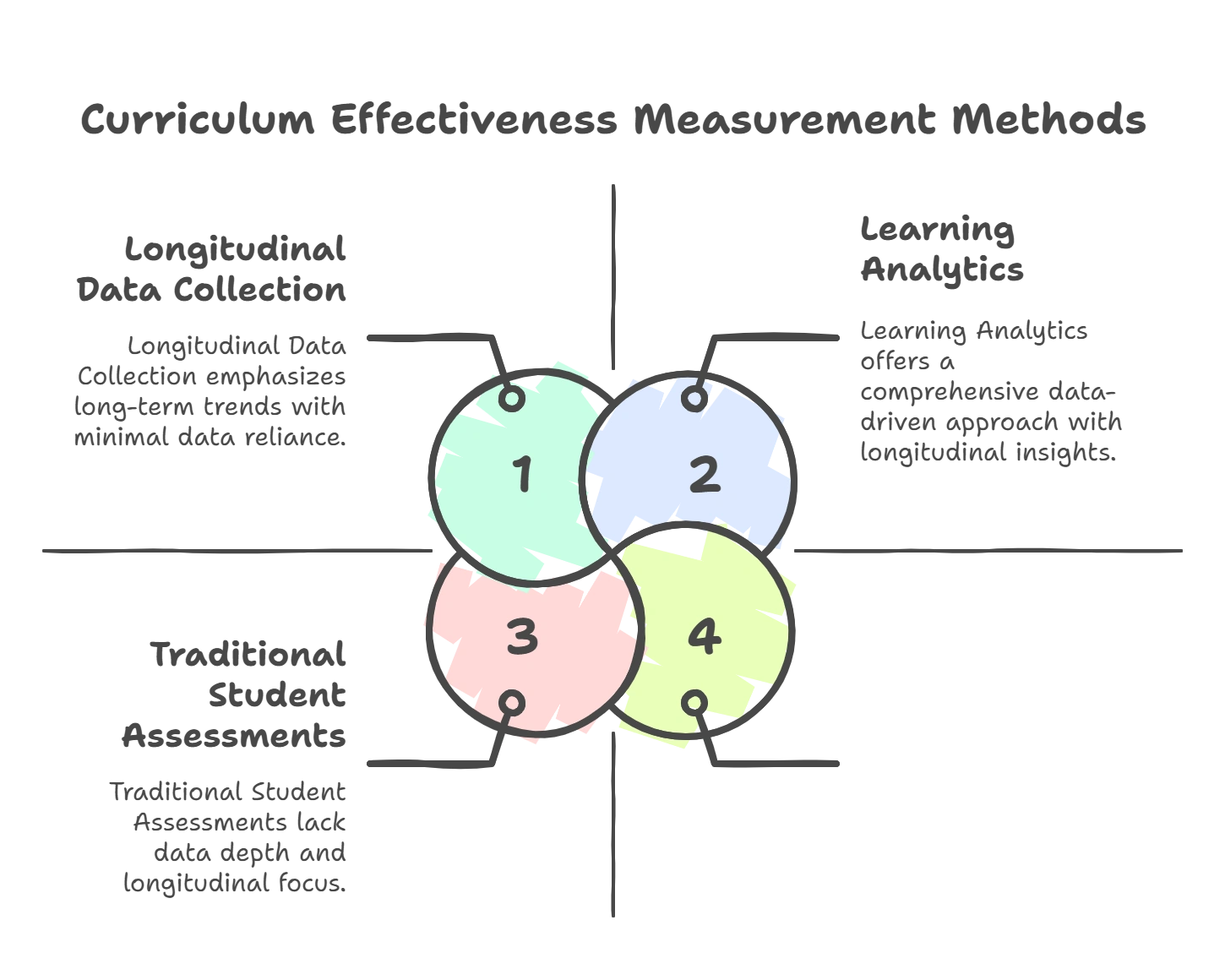
Core Methods for Measuring Curriculum Effectiveness
There are multiple methods that a curriculum specialist employs to gauge curriculum success accurately. Here’s a breakdown of key approaches:
1. Learning Analytics and Educational Data Mining
Using learning analytics, curriculum specialists can monitor how students learn and interact with the course material. It reveals certain patterns or trends that could influence learning results. Techniques include:
- Behavioral Analysis: Login frequency and time spent on the tasks help trace the student engagement level.
- Predictive Analytics: Specialists can use predictive models to foresee which students might struggle. This enables timely intervention.
- Real-Time Feedback Loops: This allows instant curriculum tweaks based on student feedback and enhances the learning experience as the course progresses.
2. Student Assessments Beyond Standardized Testing
Standardized testing is important but should not be the only measure of achievement. Alternative assessments will enable a much broader view of the curriculum impact:
- Project-Based Assessments: These tests promote the use of knowledge in practical contexts and critical thinking.
- Competency-Based Evaluations: Such evaluations concentrate on acquiring particular skills instead of getting good grades to ensure students meet set standards.
3. Longitudinal Data Collection
Monitoring students over time offers a thorough understanding of the curriculum’s long-term effects. Using longitudinal data collection, curriculum experts can assess the following:
- Course Progress: Tracking student retention rates and progression trends helps determine whether the program encourages sustainable learning.
- Post-Graduation Success Metrics: Analyzing metrics like job placement rates and further education engagement offers insight into the curriculum’s real-world value.
Best Practices for Implementing Effective Curriculum Evaluation
Here are the best practices to maintain an efficient and effective evaluation framework:
- Establish Unambiguous Key Performance Indicators (KPIs): Decide on specific success criteria, like exam scores and job placements. This facilitates progress tracking.
- Create a Balanced Assessment System: For effective learning, it is best practice to implement both formative assessment (to give regular feedback) and summative assessment (to give evaluation at the end of the course).
- Perform Regular Curriculum Audits: Curriculum review ensures that the course content and teaching strategies are current with industry standards and academic expectations. Frequent reviews by curriculum experts prevent the changes from taking too long to effect.
- Engage All Stakeholders in the Process: Faculty members, students, and employers participate in curriculum assessment, broadening its scope and enhancing its effectiveness.
- Integrate Technology in Evaluation: From online assessment tools to AI-driven analytics platforms, technology can simplify and enhance the evaluation process.
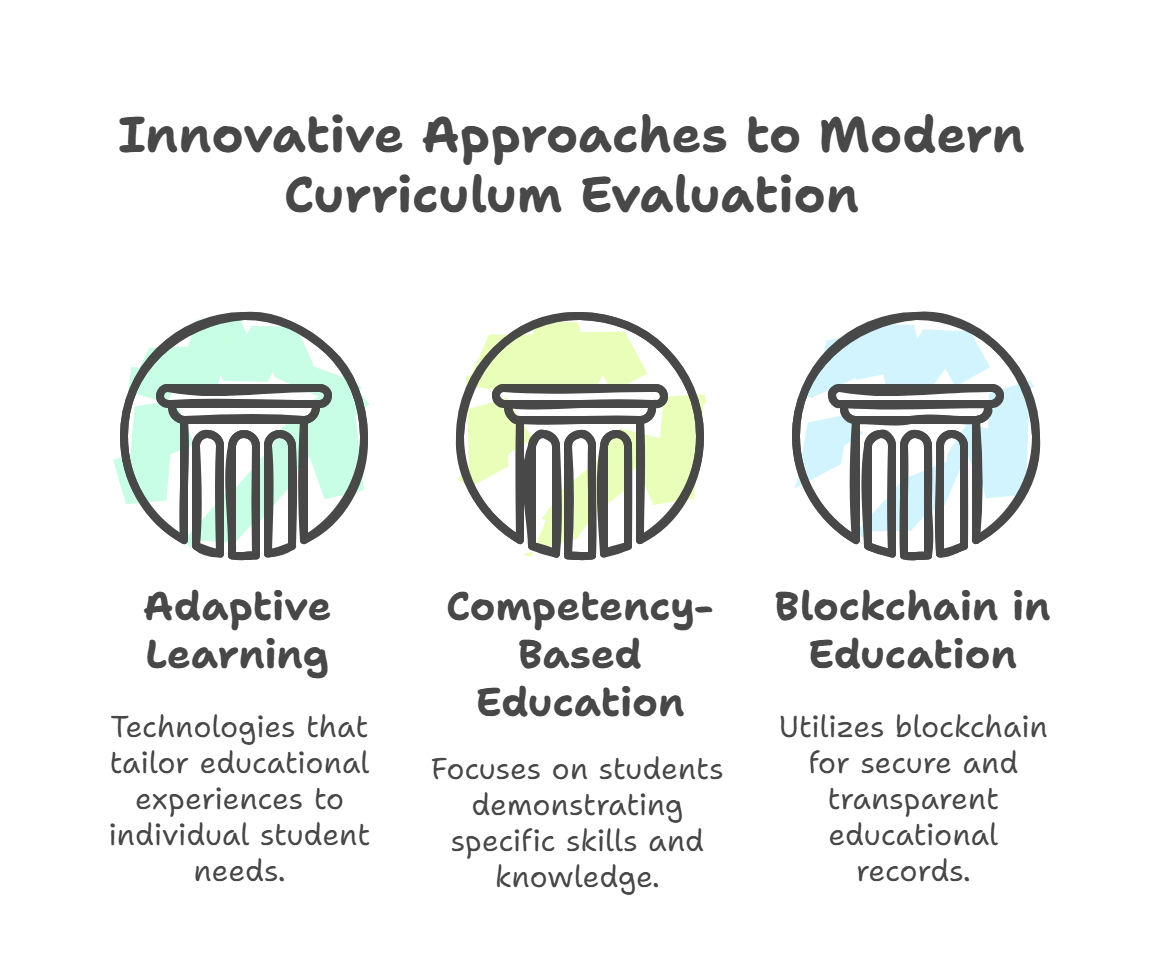
Emerging Trends in Curriculum Evaluation
To stay competitive, universities and curriculum specialists must adopt cutting-edge tools and trends that align with the modern educational landscape. Here are the latest innovations shaping curriculum evaluation:
1. Adaptive Learning Technologies
Adaptive learning utilizes AI to adjust content and resources according to each student’s learning pace and style. This makes evaluations more accurate and personalized.
- Customized Learning Pathways: AI creates tailored pathways for students, optimizing their learning experience based on real-time performance data.
- Enhanced Student Engagement: Adaptive technologies can boost engagement and retention rates by focusing on individual progress.
2. Competency-Based Education
CBE (competency-based education) is one way of assessing students in class. In this approach, a learner is considered to be a master of specific skills, knowledge, and content instead of class attendance. It is an approach to curriculum evaluation focusing more on the end results, leading to better outcomes than higher learning for those lacking formal education.
- Objective-Driven Progress: Students move forward only when they demonstrate competence, ensuring skills mastery across all curriculum elements.
- Alignment with Workforce Needs: CBE links educational objectives to real-world skills, creating more industry-ready graduates.
3. Blockchain Technology in Education
Blockchain provides a secure, transparent method for tracking and recording academic achievements, which can help ensure curriculum accountability.
- Immutable Records: Students’ achievements are securely stored, reducing fraud and providing clear evidence of curriculum impact.
- Global Recognition: Blockchain technology enables institutions to verify student competencies globally, aligning with international educational standards.
Wrapping Up
The tools and methods for measuring curriculum effectiveness are continuously changing. While rapid technological leaps are partly responsible for this, universities are also increasingly adopting flexible, student-centered models where skill development and lifetime learning are emphasized more than just attaining good grades in standardized tests.
Even though curriculum development is no easy task, with Hurix Digital, it’s seamless.
Hurix Digital offers innovative higher education solutions that make curriculum design efficient and technologically advanced. Our digital learning platform has tools for real-time curriculum evaluation and data insights to empower universities to stay competitive and meet evolving educational standards.
Looking for a way to elevate your institution’s curriculum effectiveness?
Connect with us to explore how our solutions can create an impactful, future-ready curriculum.
Summarize with:

Senior Vice President – Business Development
at Hurix Digital, with over 25 years of experience in EdTech and workforce learning. He excels in business development, customer relationship management, and scaling digital learning solutions, driving global growth through innovative content, simulations, and AI‑driven training offerings
 A Space for Thoughtful
A Space for Thoughtful 

